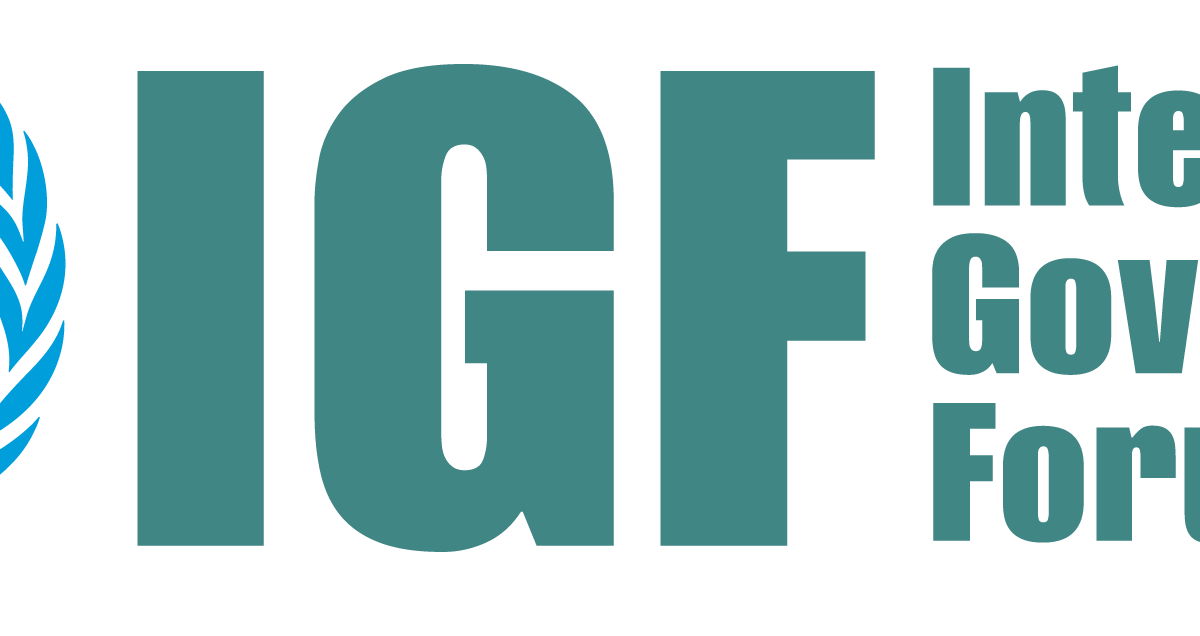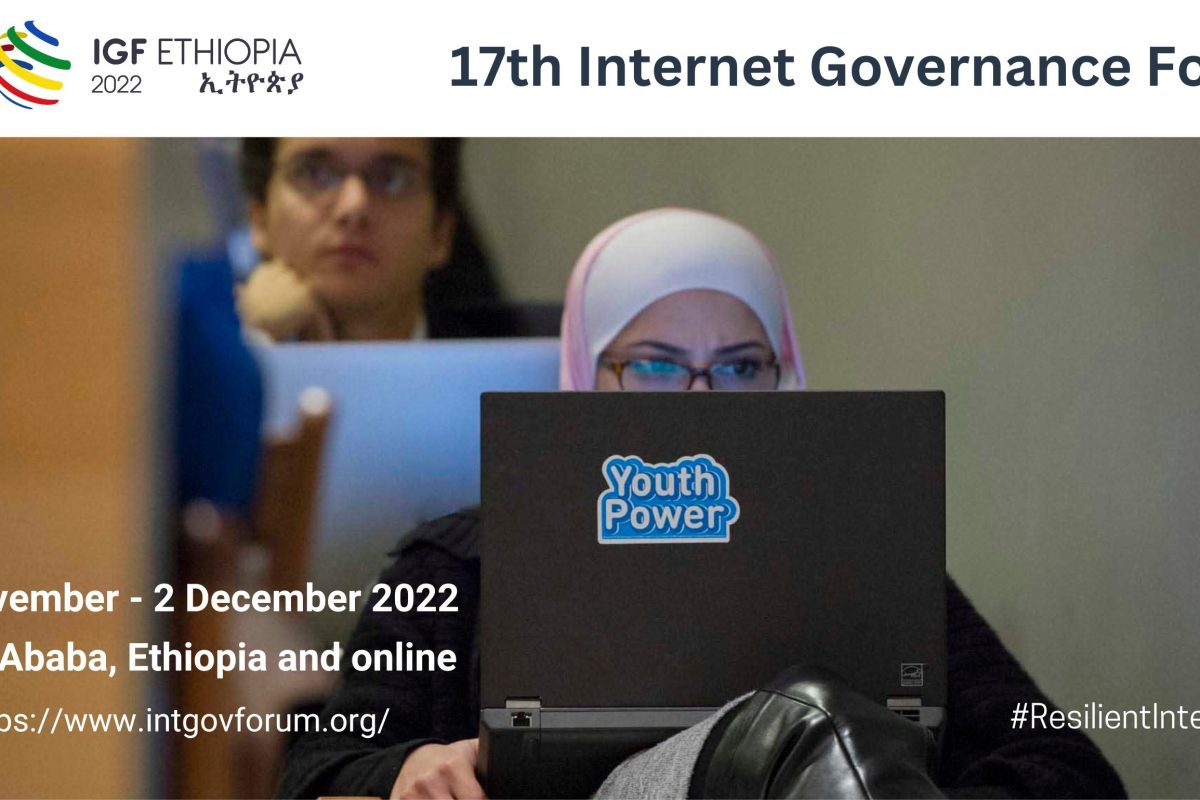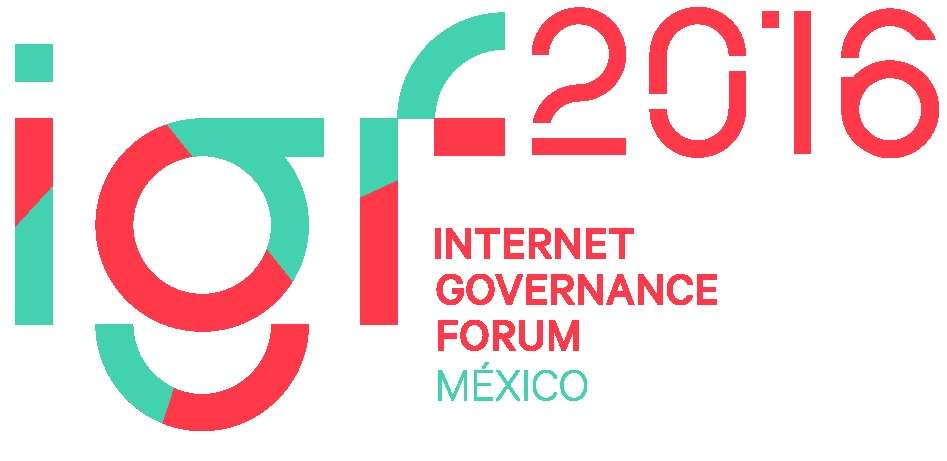It will be the 18th annual meeting of the Internet Governance Forum this year. Click here for further details on the event.
CIPESA At the 2022 Internet Governance Forum
By CIPESA Writer |
The global internet governance community is set to convene in Addis Ababa, Ethiopia, for the 17th Internet Governance Forum (IGF) from November 28-December 2, 2022. Ethiopia is hosting the IGF 2022 against a backdrop of internet freedom reforms, a recently liberalised telecommunications sector and an ongoing conflict that has seen the Tigray region without internet access for two years.
The IGF 2022 theme of Resilient Internet for a Shared Sustainable and Common Future, and the five sub-themes which are drawn from the Global Digital Compact (GDC) in the UN Secretary-General’s Our Common Agenda report, resonate with the work of the Collaboration on International ICT Policy for East and Southern Africa (CIPESA).
- Connecting All People and Safeguarding Human Rights
- Avoiding Internet Fragmentation
- Governing Data and Protecting Privacy
- Enabling Safety, Security and Accountability
- Addressing Advanced Technologies, including Artificial Intelligence (AI)
CIPESA will co-convene and participate in various sessions at the IGF 2022 to showcase its work that supports the ambitions of the GDC.
A joint effort by DefendDefenders, Greenhost, Digital Society of Africa, Dig/Sec Initiative, Digital Security Alliance, AccessNow, CChub, Center for Digital Resilience, and CIPESA will run an onsite digital security hub to build the digital resilience of at-risk groups and organisations.
At a session titled “Jointly tackling disinformation and promoting human rights” facilitated by the AU-EU Digital for Development (D4D) Hub, CIPESA will contribute in an open exchange of ideas, experiences and lessons learned on how to address disinformation through a multi-stakeholder and human-centric approach.
Furthermore, CIPESA is among the organisers of the Dynamic Coalition roundtable on Strengthening digital ecosystems through shared principles and the Day 0 event on Shaping global digital governance and measuring meaningful connectivity for all: the ROAM approach, both of which are in support of ongoing efforts by CIPESA and UNESCO to raise awareness about and application of the Internet Universality Indicators across more countries in Africa.
The CIPESA team will also feature on a panel discussion on technology and human rights as part of the Peer Learning Event for National Human Rights Institutions (NHRIs) hosted by Danish Institute for Human Rights.
Further, CIPESA will participate at the Africa member convening of the Association for Progressive Communications (APC) and at a Digital ID Civil Society Summit hosted by the Open Society Foundations, under the auspices of an external digital ID fund and initiative (DIDIF), housed at Rockefeller Philanthropic Advisors.
Follow @cipesaug and #InternetFreedomAfrica
Kenya Internet Governance Forum 2020
The Kenya Internet Governance Forum 2020 – a multi-stakeholder platform for policy dialogue bringing together all the public and private sector stakeholders, technical community, academia and civil society to openly discuss emerging issues on internet governance in an inclusive process and equal. For further information on the event, please click here.
Placing ICT Access for Persons with Disabilities at the Centre of Internet Rights Debate in Kenya
By CIPESA Writer |
Persons with disabilities have unique needs and have for long been disadvantaged, yet, the more some African countries get digitally connected, the deeper the digital divide for this community seems to grow. Indeed, debates about internet governance and the inclusiveness of the information society have not prominently featured the needs of persons with disabilities. This, despite Information and Communications Technology (ICT) having the potential to improve the lives of persons with disabilities.
However, it was a different story in Kenya a month ago, with disability rights featuring prominently at the Kenya Internet Governance (KIGF) and being the focus of a multi-stakeholder workshop held the day before the forum.
“ICT for us is an enabler; for a person with disability, ICT makes the world go round,” remarked Erick Ngondi of the United Disabled Persons of Kenya (UDPK), at the end of a workshop organised by the Collaboration on International ICT Policy for East and Southern Africa (CIPESA) alongside the Kenya Internet Governance Week that is spearheaded by the Kenya ICT Action Network, or KICTANet. “For me this has been one of the first meetings as relates to ICT and disability, so this is an excellent move.”
The workshop brought together 28 participants who included representatives of disabled persons’ organisations, government departments, telecom companies, academic institutions, technology companies, civil society organisations, and the media. The workshop explored ICT inclusion obligations for the state and for private companies and discussed what Kenya needs to do so as to improve access and usage of ICT for persons with disabilities. (Watch video with highlights from the meeting.)
“This workshop is one of its kind because it is not only about issues of physical accessibility but also informational and technological accessibility for persons with disabilities. This is a good initiative by CIPESA and I want to applaud them for this. It is a journey that has started and I look forward to us going on with this journey until we achieve our goal of persons with disabilities being included in technology.” George Shimanyula, Cheshire Disability Services Kenya.
In addition, the workshop disseminated a draft tool for monitoring compliance and implementation of ICT and disability rights obligations, including those specified by national laws and the United Nations Convention on the Rights of Persons With Disabilities (CRPD). The aim was to receive feedback on the tool, and to create awareness of how state and non-state actors can assess the compliance of government departments and private entities with digital accessibility obligations.
Kenya’s constitution is strong on disability rights, outlawing discrimination on the grounds of disability in article 27(4); and providing that a person with disability shall be entitled to treatment with respect and dignity, access educational institutions and facilities, have reasonable access to all places, public transport and information, and access materials and devices including for communications (article 54). Moreover, Kenya’s National ICT Policy of 2016 outlines, under article 13, strategies for “an accessible ICT environment in the country in order to enable persons with disabilities to take full advantage of ICTs.”
https://twitter.com/BakeKenya/status/1156905814122217487
However, as was noted by Judy Okite, founder of the Association for Accessibility and Equality, many of the digital accessibility strategies outlined in the 2016 policy remained unfulfilled. While Kenya’s government is making significant steps to move its services online, the platforms are not favorable to those who are visually imparied. “Are we widening the digital divide by moving our services online? Is ICT recognised as an enabler for PWD in Kenya?” wondered Okite.
The Government will where appropriate take measures to:
(a) ensure that ICT services and emergency communications made available to the public are provided in alternative accessible formats for persons with disabilities (PWD);
(b) review existing legislation and regulations to promote ICT accessibility for PWDs in consultation with organisations representing PWDs among others;
(c) promote design, production and distribution of accessible ICT at an early stage;
(d) ensure that persons with disabilities can exercise the right to access to information, freedom of expression and opinion;
(e) require both public and private entities that render services to the public to provide information and services in accessible and usable formats for persons with disabilities;
(f) Require content producers for distribution and public consumption in Kenya to produce such content in accessible format such as audio description, audio subtitles, captions and signing for access to persons with disabilities.
(g) ensure that websites of government departments and agencies comply with international web accessibility standards and are accessible for persons with disabilities
(h) provide incentives to providers of accessible technology solutions including software, hardware and applications
(i) take such measures that will lessen the burden of acquisition of accessible technologies and associated gadgets by PWDs through fiscal means such as tax exemptions, subsidization, funding acquisitions, etc.
(j) ensuring that licensed ICT service providers offer special tariff plans or discounted rates for persons with disabilities communicate with the rest of society.
(k) Ensure that licensed providers of telecommunications services make available services and supporting technologies for persons with disabilities including emergency services, accessible public phones and relay services to enable persons with speech, hearing and seeing disabilities
Similar sentiments were shared by lawyer and digital rights activist Angela Minayo, who said the workshop “was very productive” and had enabled participants to realise that there is a gap in the implementation of ICT policy and in awareness of how national policies and international legal frameworks provide for persons with disabilities to be able to access and use ICT.
Conversations from the workshop were carried forward to the KIGF, with a session on inclusion, where Okite joined Paul Kiage (Communications Authority), Nivi Sharma (BRCK), Ben Roberts (Liquid Telecom), Josephine Miliza (KICTANet) and Alfred Mugambi (Safaricom) on a panel.
Kiage, an assistant director in charge of the Universal Service Fund (USF), said the fund had collected KShs 9 billion (USD 86.6 million), mostly used to extend network coverage to areas without voice services and to offer broadband connection to 896 secondary schools across the 47 counties. He said they had installed JAWS software and other assistive devices in eight learning institutions, partnered with the National Council for Persons with Disabilities to create a portal to enable persons with disabilities to access information including job advertisements, and created platforms in some libraries to enable accessibility to digital content.
But, according to Okite, despite USF’s efforts, “the digital divide is growing bigger for persons with disabilities”. Research she was part of last year showed that computers in some of the learning institutions had not been replaced for several years, requisite software was not installed or out of date, and staff managing the labs were not trained to teach users. Sustainability of the initiative was thus in question.
Kiage’s response? “We could do a lot more because we know there’s even primary schools that are catering for persons with disabilities in Kenya so we could go lower and support such schools.”
As of March 2019, Kenya had a mobile penetration of 106%, or 51 million subscriptions, while internet subscriptions stood at 46.8 million, of which 46.7% were on broadband. But as the KIGF panel on inclusion heard, segments of Kenyans can not afford to use ICT, and those in rural areas, poor and uneducated women, and many persons with disabilities were cited.
Dr. Wairagala Wakabi of CIPESA asked the Kenya government to conduct a gap analysis to establish the unmet ICT needs of persons with disabilities, collect on a regular basis disaggregated data that shows how persons with different types of disabilities are using technology and the challenges hindering greater use, and invest a larger portion of universal service funds in promoting digital accessibility. He added that Kenya should grow awareness about assistive technologies and make these technologies affordable.
“We should leave no one behind when it comes to digital inclusion,” he said. “Clearly, the Communications Authority can do more to improve access for people with disabilities, including through the use of the Universal Service Fund,” he said.
The private sector needs to be compliant too, and to be held to account to fulfil its obligations. In Kenya, and indeed across Africa, Safaricom has been a pace-setter. Last November, it launched the DOT Braille Watch service to enable the use of its M-Pesa mobile money service by persons with disabilities, said Karimi Ruria, Public Policy Manager at the provider. In December 2017, Safaricom introduced the Interactive Voice Response (IVR) that enables visually impaired and blind customers to control their M-Pesa transactions.
How Applicable is the Multi-stakeholder Approach to Internet Governance in Africa?
By Ashnah Kalemera |
What is the value for Africans in international Internet Governance processes if the approach towards Internet governance on the continent has not fully embraced the multi-stakeholder model? This was among the concerns heard during debates at the 11th Internet Governance Forum (IGF), as some participants questioned the applicability of the global internet governance agenda to Africa.
At a global level, the IGF, an initiative of the United Nations, discusses public policy issues related to the internet. The annual gathering drives best practices and common understanding of how to maximise internet opportunities and address the risks and challenges it faces. At the core of the IGF is the multi-stakeholder approach which aims to bring together individuals, groups or organisations with a stake in the internet to cooperate in advancing policy and practice for its development globally.
This approach is said to be “optimal” in ensuring government, business, civil society and the technical community take part in making policy decisions for the internet that are accountable, sustainable and effective.
Why the multi-stakeholder approach?
Internet Governance: Why the Multi-stakeholder Approach Works (Internet Society) |
National and regional IGF initiatives (NRI) are similarly conducted to address community needs and involve multiple stakeholders. However, few African stakeholders participate at the global IGF and NRIs, rendering the principles of multi-stakeholderism difficult to achieve.
More than 2,000 participants from 123 countries attended the 2016 IGF held in Mexico. By stakeholder group, civil society constituted the majority (44.5%). Government representation was 20.5% and private sector was 15.5%. By region, Africa had the second lowest regional representation– 6.7%, beating only Eastern Europe from which 2.5% of participants originated.
There are up to 16 national, sub-regional and regional IGFs in Africa. Of the African countries that hosted forums during 2016, most were civil society led with some support from government reported – for instance in Ghana, Nigeria and Uganda. However, there was limited participation by the judiciary and law enforcement, youth and the private sector.
Organisers of the Africa Internet Governance Forum (AIGF) and national forums say there is a challenge of multi-stakeholder participation at gatherings on the continent due to lack of political will and limited knowledge and awareness of internet governance issues, among other reasons.
Organisers of the regional AIGF also reported limited representation by policy makers and other government officials. Private sector and youth were reportedly underrepresented at the fifth AIGF held in Durban, South Africa, last October.
According to Olusegun Olugbile who sits on the technical committee of the AIGF and the Nigeria national forum, limited stakeholder participation in national and regional internet governance forums was due to a lack of trust and confidence in the dialogue and ensuing outcomes.
Speaking at the African Union (AU) session at the IGF, Olugbile stated that bringing more stakeholders to the table on internet governance in Africa requires “embracing” policy documents from the continent, such as the African Union Convention on Cyber Security and the African Declaration on Internet Rights – less so international instruments – so as to ensure contextual understanding of key concerns. This would contribute to a demonstration of value in participation for the stakeholders currently not participating. Furthermore, it would ensure that agendas for debate are localised to suit African needs and follow ups on recommendations are directly linked to the mandate of the relevant stakeholders.
Whereas discussants at the Africa themed sessions also called for more public-private partnership efforts in pursuing the principles of internet governance in Africa, regional bodies such as the AU were also called upon not only to convey outcomes to governments but to actively advocate and “push” for the implementation of recommendations from the AIGF among member states.
Meanwhile, the Africa School of Internet Governance (AfriSIG), which started in 2013 was commended for its role in bridging the internet governance knowledge and skills gap on the continent. To-date, the school has graduated over 150 individuals from government, the private sector and civil society across Africa in the principles and procedures of internet governance. Continued capacity building efforts by the school and other practitioners were recommended.
The 2016 IGF was convened under the theme ‘Enabling Inclusive and Sustainable Growth” from December 6–9, 2016 in Jalisco, Mexico.




